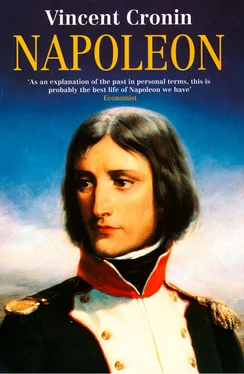Vincent Cronin - Napoleon
Здесь есть возможность читать онлайн «Vincent Cronin - Napoleon» — ознакомительный отрывок электронной книги совершенно бесплатно, а после прочтения отрывка купить полную версию. В некоторых случаях можно слушать аудио, скачать через торрент в формате fb2 и присутствует краткое содержание. Жанр: unrecognised, на английском языке. Описание произведения, (предисловие) а так же отзывы посетителей доступны на портале библиотеки ЛибКат.
- Название:Napoleon
- Автор:
- Жанр:
- Год:неизвестен
- ISBN:нет данных
- Рейтинг книги:3 / 5. Голосов: 1
-
Избранное:Добавить в избранное
- Отзывы:
-
Ваша оценка:
- 60
- 1
- 2
- 3
- 4
- 5
Napoleon: краткое содержание, описание и аннотация
Предлагаем к чтению аннотацию, описание, краткое содержание или предисловие (зависит от того, что написал сам автор книги «Napoleon»). Если вы не нашли необходимую информацию о книге — напишите в комментариях, мы постараемся отыскать её.
Napoleon — читать онлайн ознакомительный отрывок
Ниже представлен текст книги, разбитый по страницам. Система сохранения места последней прочитанной страницы, позволяет с удобством читать онлайн бесплатно книгу «Napoleon», без необходимости каждый раз заново искать на чём Вы остановились. Поставьте закладку, и сможете в любой момент перейти на страницу, на которой закончили чтение.
Интервал:
Закладка:
Second Lieutenant Buonaparte never read lives of generals, histories of war or books of tactics. Most of his reading stemmed from a glaringly obvious fact: something was wrong with France. There was injustice, there was unnecessary poverty, there was corruption in high places. On 27 November 1786 Napoleon wrote in his notebook: ‘We are members of a powerful monarchy, but today we feel only the vices of its constitution.’ Napoleon, like everyone else, saw that reform was needed. But what sort of reform? In order to articulate his own feelings and to seek an answer, Napoleon began to read history and political theory.
He started with Plato’s Republic , about which his main conclusion was that ‘Every man who rules issues orders not in his own interest but in the interest of his subjects.’ From Rollin’s Ancient History he took notes on Egypt – he was shocked by the tyranny of the Pharaohs – Assyria, Lydia, Persia and Greece. Athens, he notes, was originally ruled by a king, but we cannot conclude from this that monarchy is the most natural and primordial form of government. Of Lycurgus he notes: ‘Dykes were required against the king’s power or else despotism would have reigned. The people’s energy had to be maintained and moderated so that they should be neither slaves nor anarchists.’ Of Marigny’s History of the Arabs he read three out of four volumes, and ignored the pages on religion. ‘Mahomet did not know how to read or write, which I find improbable. He had seventeen wives.’ China he glanced at in Voltaire’s Essai sur les Maurs , and quoted Confucius on the obligation of a ruler continually to renew himself in order to renew the people by his example.
In these and other notes two main attitudes stand out. Napoleon had a keen sympathy with the oppressed and a distaste for tyranny in any form, whether it was the Almighty inflicting eternal damnation on souls or Cardinal de Fleury boasting of having issued 40,000 lettres de cachet. But there are no sweeping condemnations. Although unsympathetic to the absolutism of Louis XIV’s court, he quotes approvingly the remark of Louis XIV’s grandson when declining a new piece of furniture for his house: ‘The people can get the necessities of life only when princes forbid themselves what is superfluous.’
The book which seems to have influenced Napoleon most and on which he took most notes was a French translation of John Barrow’s A New and Impartial History of England, from the Invasion of Julius Caesar to the Signing of Preliminaries of Peace, 1762. The French translation stopped in 1689, that is, safely before the long series of French defeats.
Napoleon’s notes on Barrow are devoid of any such chauvinism, save perhaps the very first: ‘The British Isles were probably the first peopled by Gallic colonists.’ The invasion of Caesar he skipped, probably because he already knew it well, but he copied out a long story of Offa’s repentance, and his institution of Peter’s pence. He gave much space to Alfred and to Magna Carta, noting that the Charter had been condemned by the Pope. All constitutional struggles Napoleon followed in detail, such as the arraignment of Edward II and Wat Tyler’s rebellion. At the end of Richard II’s reign Napoleon added a personal comment: ‘The principal advantage of the English Constitution consists in the fact that the national spirit is always in full vitality. For a long spell of years, the King can doubtless arrogate to himself more authority than he ought to have, may even use his great power to commit injustice, but the cries of the nation soon change to thunder, and sooner or later the King yields.’
Napoleon treated the Reformation in detail. Summing up the reign of James I, he noted with approval: ‘Parliament henceforward regained its ascendancy.’ Of Charles I Napoleon took a poor view. He made notes on Pym, the first Parliamentary demagogue, but saved his enthusiasm for Simon de Montfort and later the Protector Somerset, who had died in sterner ages to make possible the successes of Pym and Cromwell. Of Simon de Montfort he wrote: ‘There perishes one of the greatest Englishmen, and with him the hope his nation had of seeing the royal authority diminished.’
The French translation of Barrow’s history ended in 1689 with the triumph of constitutional monarchy. Barrow’s message was clear: only a constitution defending the people’s rights could check arbitrary government. In the light of this message Napoleon took a new look at the history of France. The original government of the Franks, he decided, was a democracy tempered by the power of the King and his knights. A new king was made by being lifted on a shield and acclaimed by his troops. Then bishops arrived and preached despotism. Pepin, before receiving the crown, asked permission from the Pope. Gradually the aura of kingship took hold of men’s minds, and kings usurped an authority never originally granted them. They no longer ruled in the interests of the people who had originally given them power. In October 1788 Napoleon was planning to write an essay on royal authority: he would analyse the unlawful functions exercised by kings in Europe’s dozen kingdoms. Doubtless he was thinking of Louis XVI’s power, with a stroke of the pen, to send any Frenchman to the Bastille. What was wrong with France, Napoleon decided, was that the power of the King and the King’s men had grown excessive; the reform Napoleon wanted – and the point is important in view of his future career-was a constitution which, by setting out the people’s rights, would ensure that the King acted in the interests of France as a whole.
To an impartial observer of Europe around the year 1785 the salient fact would have been the success of unconstitutional monarchies, the so-called enlightened despotisms. In Portugal, Spain and Sweden kings of this type were reforming and modernizing, while in Prussia Frederick II and in Russia Catherine II were ruling arbitrarily yet earning the epithet ‘Great’. It is interesting that Napoleon averted his gaze from these personal successes and fixed it on the odd country out – England, with her monarchy limited by law. He did so partly because he was an admirer of Rousseau, whose social contract theory derives from Locke, but even more because of his family background of respect for the law and his personal sympathy with the oppressed.
Napoleon, then, wanted reform in France. He wanted a constitutional monarchy which ruled in the interests of the people. This decision was strengthened by a new turn of events in Corsica. There the French had done an about-face. In September 1786 Marbeuf died, and the island was henceforth administered by the Ministry of Finance. A set of bureaucrats moved in, and since France was heading for bankruptcy, had orders to cut expenditure. They refused to pay subsidies due on past improvement schemes to Letizia, who found herself in financial difficulties, especially since the presence of French bureaucrats and troops had sent up the cost of living: corn doubled in price between 1771 and 1784.
Napoleon’s first reaction was to seek justice. He went to Paris in 1787 to see the man at the top, the Controller General. He specified the sum owing, but added with feeling that no sum ‘could ever compensate for the kind of debasement a man experiences when he is made aware at every moment of his subjection.’
The Ministry did not pay Letizia her money. Nor did the French hand back the Odone property, because one of the officials, a Monsieur Soviris, was an interested party. Again Napoleon took action. He wrote to the Registrar of the Corsican States-General, Laurent Giubega, who happened to be his godfather, protesting in strong language about unenergetic tribunals and offices, where the decision lies with one man, ‘a stranger not only to our language and habits but also to our legal system … envious of the luxury he has seen on the Continent and which his salary does not allow him to attain.’
Читать дальшеИнтервал:
Закладка:
Похожие книги на «Napoleon»
Представляем Вашему вниманию похожие книги на «Napoleon» списком для выбора. Мы отобрали схожую по названию и смыслу литературу в надежде предоставить читателям больше вариантов отыскать новые, интересные, ещё непрочитанные произведения.
Обсуждение, отзывы о книге «Napoleon» и просто собственные мнения читателей. Оставьте ваши комментарии, напишите, что Вы думаете о произведении, его смысле или главных героях. Укажите что конкретно понравилось, а что нет, и почему Вы так считаете.












